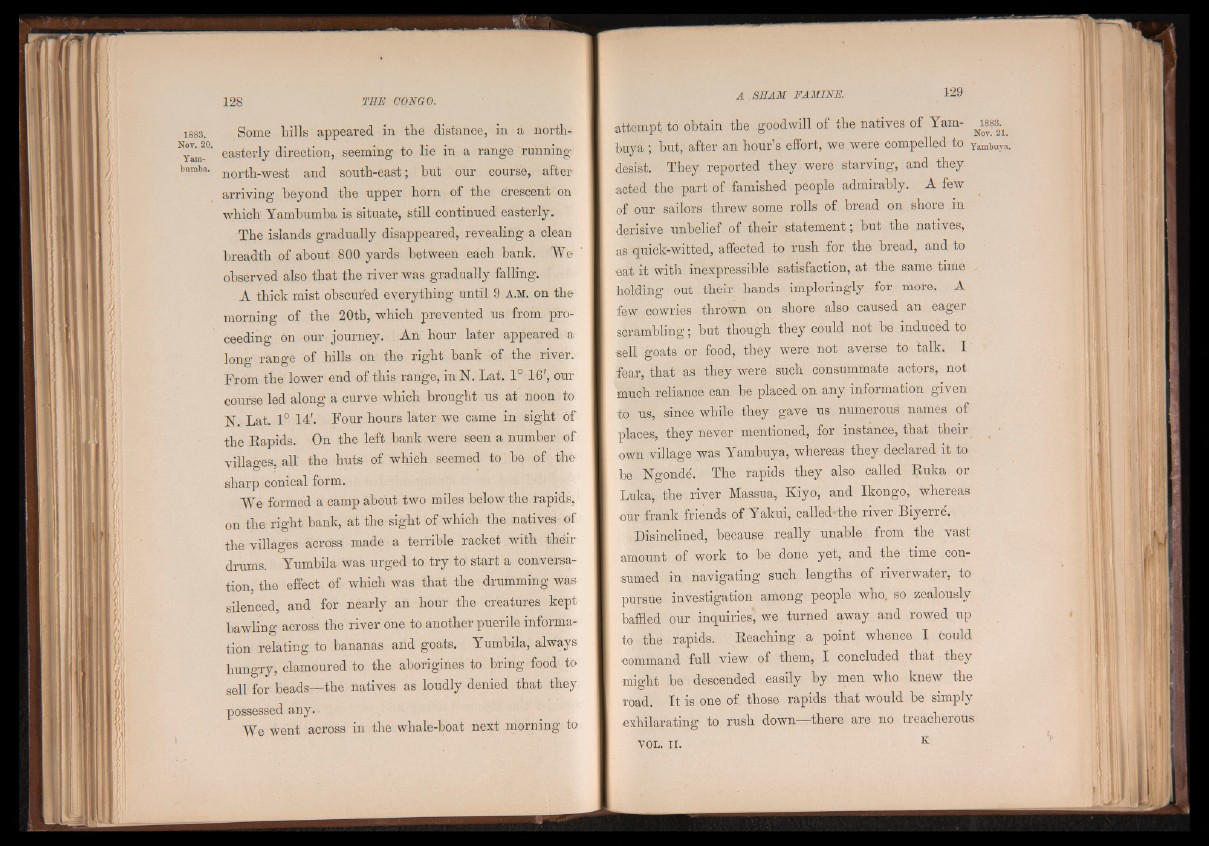
Y am -
bumba.
Some hills appeared in the distance, in a northeasterly
direction, seeming to lie in a range running*
north-west and south-east; but our course, after
arriving beyond the upper horn of the crescent on
which Yambumba is situate, still continued easterly.
The islands gradually disappeared, revealing a clean
breadth of about 800 yards between each bank. We
observed also that the river was gradually falling.
A thick mist obscured everything until 9 a .m . on the
morning of the 20th, which prevented us from proceeding
on our journey. An hour later appeared a
long range of hills on the right hank of the river.
From the lower end of this range, in N. Lat. 1° 16', our
course led along a curve which brought us at noon to
NY Lat. 1° 14'. Four hours later we came in sight of
the Rapids. On the left bank were seen a number of
villages, all the huts of which seemed to be of the O '
sharp conical form.
We formed a camp about two miles below the rapids,
on the right bank, at the sight of which the natives of
the villages across made a terrible racket with their
drums. Yumbila was urged to try to start a conversation,
the effect of which was that the drumming was
silenced, and for nearly an hour the creatures kept
bawling across the river one to another puerile information
relating to bananas and goats. Yumbila, always
hungry, clamoured to the aborigines to bring food to
sell for beads—the natives, as loudly denied that they
possessed any..
We went across in the whale-boat next morning to
A SEAM FAMINE. 129
attempt to obtain the goodwill of the natives of Yam-
buya ; hut, after an hour’s effort, we were compelled to Yambuya.
desist. They reported they were starving, and they
acted the part of famished people admirably. A few
of our sailors threw some rolls of bread on shore in
derisive unbelief of their statement ; but the natives,
as quick-witted, affected to rush for the bread, and to
eat it with inexpressible satisfaction, at the same time
holding out their hands imploringly for more. A
few cowries thrown on shore also caused an eager
scrambling ; but though they could not be induced to
■sell goats or food, they were not averse to talk. X
fear, that as they were such consummate actors, not
much reliance can be placed on any information given
to us, since while they gave us numerous names of
places, they never mentioned, for instance, that their
own village was Yambuya, whereas they declared it to
be Ngonde. The rapids they also called Ruka or
Luka, the river Massua, Kiyo, and Ikongo, whereas
our frank friends of Yakui, called*the river BiyerreY
Disinclined, because really unable from the vast
amount of work to be done yet, and thè time consumed
in navigating such lengths of riverwater, to
pursue investigation among people who, so zealously
baffled our inquiries' we turned away and rowed up
to the rapids. Reaching. a point whence I could
command ■ full view of them, X concluded that . they
might be descended easily by men who knew the
road. Xt is one of those rapids that would be simply
exhilarating to rush down—there are no treacherous